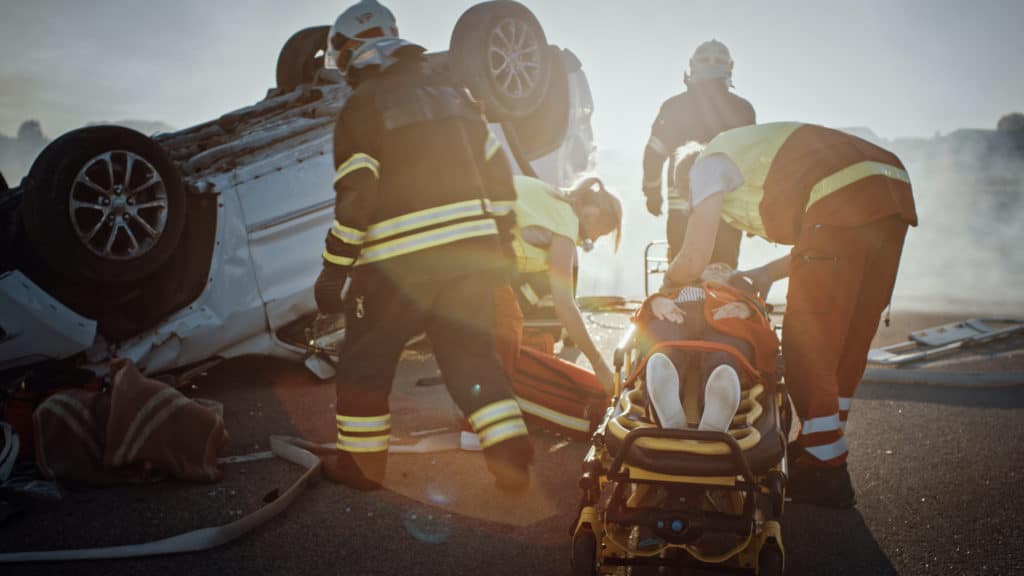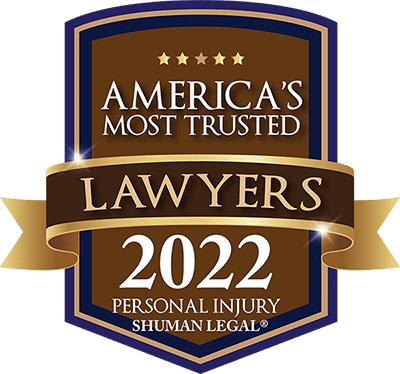De un abogado de accidentes automovilísticos de Chicago: tipos de lesiones comunes en accidentes automovilísticos
Si tiene un accidente automovilístico, asegúrese de llamar a Shuman Legal®, ya que somos un abogado de accidentes automovilísticos en Chicago.
Si bien los accidentes automovilísticos pueden causar muchas lesiones diferentes, algunos tipos de lesiones son más comunes que otros. A veces, el efecto completo de estas lesiones no se nota hasta mucho más tarde.
Dependiendo de cómo suceda un accidente automovilístico, cualquier parte del cuerpo puede lastimarse. El tipo y la gravedad de estas lesiones pueden cambiar según estas cuatro cosas clave:
- ¿La persona lesionada llevaba puesto el cinturón de seguridad?
- ¿Ocurrió el accidente desde atrás, de lado o de frente?
- ¿Estaba la persona sentada en la parte delantera o trasera del automóvil?
- ¿Cuál era la velocidad del automóvil cuando ocurrió el choque?
Si usted o un ser querido resulta lesionado en un accidente automovilístico, merece una compensación. Confíe en los 35 años de experiencia práctica de Shuman Legal®. No tiene que luchar solo contra el sistema, deje que uno de nuestros abogados de lesiones personales lo guíe.
Ahorre su valioso tiempo, deje que nuestro equipo de abogados especializados en accidentes automovilísticos en Chicago pelee por usted y asegúrese de que reciba la compensación total que se merece.
Las lesiones comunes de accidentes automovilísticos a menudo se clasifican como lesiones por impacto o lesiones penetrantes. Estas lesiones pueden ser gravemente incapacitantes o posiblemente incluso mortales, según la gravedad de la lesión.
Ayudamos a personas como tú
No confíe solo en nuestras palabras, escuche a uno de nuestros clientes satisfechos.
Accidente de coche con lesión de tejidos blandos | Lesiones por impacto
Entre los tipos de lesiones más comunes en un accidente automovilístico, las lesiones de los tejidos blandos provocan daños en la parte más blanda del cuerpo, principalmente los músculos, ligamentos y tendones. Los efectos de las lesiones de los tejidos blandos, aunque a menudo se consideran menores en ese momento, a veces pueden provocar dolor corporal crónico.
Muchos tipos de lesiones en la espalda por accidentes automovilísticos a menudo son causados por lesiones que pasan desapercibidas o que parecen ser lesiones menores, como esguinces musculares o daños en la columna.
El latigazo cervical es una de las formas más comunes de lesiones de tejidos blandos. El latigazo cervical es causado por el rápido estiramiento de los músculos y ligamentos de la cabeza y el cuello en respuesta a un impacto repentino. El latigazo cervical generalmente se puede tratar con primeros auxilios, pero a veces puede provocar una lesión en el tronco encefálico debido a un accidente automovilístico. Los mareos y la pérdida de la función motora son síntomas comunes de las lesiones del tronco encefálico, pero los casos más intensos pueden provocar parálisis, coma e incluso la muerte. El tratamiento es costoso y es posible que las víctimas descubran que no pueden volver al trabajo.
Creemos que usted o su ser querido merecen una compensación y apoyo para cubrir los días de trabajo perdidos y las facturas médicas, que pueden acumularse rápidamente si tiene en cuenta cuánto tiempo puede pasar en el consultorio del médico. Agregue también los costos de litigio imprevistos y se enfrenta a un golpe financiero significativo.
¡No ignore las lesiones menores de automóviles! Usted o su ser querido merecen una compensación por cada minuto de su vida perdido debido a un conductor imprudente.
¿Ha resultado lesionado en un accidente automovilístico? ¡Obtenga asesoramiento legal GRATIS ahora!
Lesiones penetrantes de automóviles como raspaduras y cortes
Objetos cotidianos como anteojos, teléfonos celulares, etc. pueden convertirse en proyectiles durante un accidente automovilístico, causando raspaduras y cortes.
Más en la categoría de lesiones menores, rasguños y cortes también pueden ser causados por vidrios rotos o partes desplazadas del automóvil. Las lesiones pequeñas generalmente se tratan con primeros auxilios básicos. Sin embargo, si se despliega una bolsa de aire como resultado de un choque, es posible que se requieran puntos de sutura u otro tratamiento médico.
Tipos de lesiones en la cabeza por accidentes automovilísticos
Tal vez una de las formas más graves de lesiones automovilísticas, las lesiones en la cabeza pueden variar desde lesiones menores, como un latigazo cervical, hasta lesiones más graves, como una TBI (lesión cerebral traumática). A diferencia del latigazo cervical y otras lesiones menores, como rasguños y contusiones, que pueden tratarse rápida y fácilmente, las lesiones cerradas en la cabeza sufridas como resultado de una colisión grave pueden provocar conmociones cerebrales y daños cerebrales más graves que no son tan fáciles de tratar.
Tipos de lesiones cerebrales por accidentes automovilísticos: las lesiones cerebrales pueden provocar la muerte o una discapacidad permanente que cambie la vida. El cerebro de una persona está dividido en varias partes, cada una haciendo su propia parte para controlar la mente y el cuerpo. Según la gravedad de la lesión y la sección del cerebro afectada, las secuelas de las lesiones cerebrales pueden provocar daños permanentes en la memoria, dificultades emocionales, problemas para comunicarse verbalmente y desafíos para coordinar el equilibrio y el movimiento regulares.
Los equipos de respuesta de los sistemas médicos de emergencia están capacitados para preguntarle a la víctima «¿Perdiste el conocimiento?» después de un accidente. En el caso de un sí, o incluso un tal vez, el equipo de EMS tomaría nota de esto para asegurarse de que la persona lesionada reciba la atención médica que necesita.
Cuando las personas sufren lesiones en la cabeza, es posible que al principio no muestren ningún síntoma. Más tarde, sin embargo, un individuo puede mostrar signos de cambios de personalidad, como irritabilidad, problemas de memoria y cambios en su perspectiva general de la vida. Por esta razón, las lesiones en la cabeza a menudo se denominan lesiones «silenciosas».
Los familiares de las víctimas deben ser conscientes de la posibilidad de que esto suceda después de un accidente. Una lesión en la cabeza relacionada con un accidente se puede diagnosticar con la ayuda de un especialista.
Usted o su ser querido merecen una compensación justa por sus lesiones cerebrales, ya sean leves o graves. Los reclamos de seguro y discapacidad pueden complicar significativamente un caso y ahogar a la mayoría de las personas en la burocracia y el papeleo durante un tiempo de recuperación que ya es difícil.
Nuestros abogados especializados en accidentes automovilísticos en Chicago pueden eliminar esa burocracia y ocuparse de los detalles mientras usted se enfoca en su recuperación. Llame a nuestra firma; Shuman Legal® al (312) 422-0700 para nuestro asesoramiento legal GRATIS.
Lesiones en el pecho
Las lesiones en el pecho se encuentran entre las peores lesiones por accidentes automovilísticos que un conductor puede experimentar. La principal causa de lesiones graves en el pecho es el pequeño espacio entre el volante y el pecho del conductor. Las lesiones torácicas más comunes en un accidente automovilístico incluyen contusiones o hematomas debido a los cinturones de seguridad. Sin embargo, los accidentes automovilísticos graves pueden causar costillas rotas u otras lesiones internas a los conductores. Las bolsas de aire también pueden causar hematomas intensos si se despliegan durante un accidente automovilístico.
Lesiones de la médula espinal
Una lesión en la médula espinal puede ser tan dañina como una lesión cerebral, esto se debe a la importante función clave de la columna vertebral de mantener la espalda recta, lo que proporciona equilibrio y flexibilidad a una persona. El daño a la médula espinal bloquea la transmisión de los mensajes del cerebro. Como resultado, pueden comenzar a producirse movimientos reflejos, pero no se pueden controlar.
Nuestra médula espinal se extiende desde la base del cuero cabelludo hasta la parte baja de la espalda, cerca de la cintura. La columna vertebral de una persona normalmente se puede dividir en cuatro partes principales:
- Columna cervical (cuello)
- Columna torácica (parte superior de la espalda)
- Columna lumbar (espalda media)
- Región sacra (espalda baja)
Una lesión de la columna cervical puede provocar tetraplejía, también conocida como cuadriplejía, una afección en la que se paralizan todas las extremidades, el tórax y la pelvis. La otra lesión espinal intensa; La paraplejía se define como la pérdida de función y sensibilidad en las piernas y la pelvis, causada por lesiones en la parte inferior de la columna, es decir, en la región torácica o lumbar.
Estas lesiones se consideran entre las lesiones más graves por accidentes automovilísticos, ya que el daño a la médula espinal no se puede deshacer. A diferencia de otras partes del cuerpo humano, la médula espinal carece de la capacidad de repararse a sí misma una vez que ha sido dañada.
Para aquellos que sufren una lesión de la médula espinal, la atención médica inmediata y el tratamiento integral son cruciales. Según estimaciones conservadoras, los costos de por vida para un paciente de 25 años que sufre de paraplejía en los Estados Unidos se estiman en alrededor de 2,5 millones de dólares estadounidenses.
Debido a estos costos más altos, los abogados y el seguro de la parte contraria intentarán intimidarlo para que acepte una compensación menos que justa. Es importante no dejarse intimidar.
Si un automovilista imprudente tiene la culpa de su lesión o la de su ser querido, usted merece una compensación por todos sus gastos médicos futuros que ocurran debido a su negligencia. Llame a uno de los bufetes de abogados más destacados de Chicago, Shuman Legal® al (312) 422-0700 para obtener nuestro asesoramiento legal GRATIS.
Lesiones dentales en accidentes de coche
Las lesiones dentales no suelen ser el primer tipo de lesión en las que piensa que involucran accidentes automovilísticos. Además del dolor experimentado por las lesiones dentales, la víctima puede tener que lidiar con costosas facturas médicas y costos de atención médica acumulados debido a sus lesiones. Además de muchos tipos de reclamos por accidentes automovilísticos, también puede reclamar una compensación por el costo del tratamiento de lesiones dentales.
Las lesiones dentales se clasifican típicamente en dos categorías: lesiones directas e indirectas. Las lesiones dentales resultantes de accidentes automovilísticos incluyen las siguientes:
- Diente luxado: esta lesión afloja el diente, permitiéndole moverse de lado a lado. Empeorará con el tiempo si un dentista no lo coloca correctamente.
- Diente avulsionado: si un diente se sale de la boca, se llama diente avulsionado. Se puede salvar si el diente se recupera y se coloca en su lugar dentro de las dos horas.
- Diente fracturado: cuando el diente se rompe dentro o fuera de las encías, se considera un diente fracturado.
Un abogado experimentado en accidentes automovilísticos de Chicago de nuestro experimentado equipo en Shuman Legal® puede ayudarlo a presentar un reclamo por dicha compensación. Llámanos y déjanos hacer lo que podamos para ayudarte.
Pérdida auditiva neurosensorial después de un accidente automovilístico
Las bolsas de aire son inmensamente importantes para salvar vidas en accidentes automovilísticos, pero uno de los eventos trágicos que pueden ocurrir debido al despliegue de las bolsas de aire es la pérdida auditiva neurosensorial. Aunque la audición de una persona a veces puede mejorar mediante una cirugía de emergencia, la pérdida auditiva neurosensorial suele ser permanente.
La pérdida de audición puede tener un impacto profundo en el bienestar físico y emocional de una persona: puede causar ansiedad, fatiga, depresión, soledad, disminución del estado de alerta, reducción de la capacidad de ingresos y empeoramiento de la salud general de una persona.
¿Ha resultado lesionado en un accidente automovilístico? ¡Obtenga asesoramiento legal GRATIS ahora!
Huesos rotos
Las fracturas parecen sencillas a primera vista, simplemente colóquelas y déjelas sanar.
Sin embargo, estas lesiones pueden provocar la pérdida de la función de una extremidad, dolor crónico e infección si el hueso sobresale a través de la piel. Los fragmentos de hueso astillados también pueden causar daños internos si entran en contacto con los órganos, como suele ser el caso de las costillas rotas.
No acepte ninguna compensación hasta que se haya sometido a pruebas médicas detalladas. Mejor aún, llámenos para comunicarse con uno de nuestros abogados de accidentes automovilísticos en Illinois para que podamos brindarle el mejor asesoramiento posible.
Extremidades amputadas
En un accidente automovilístico desafortunado, una persona puede perder una extremidad. Ocasionalmente, las amputaciones de extremidades se vuelven necesarias en los casos en que la extremidad está demasiado dañada para repararla.
Una amputación es una lesión de accidente automovilístico relativamente rara, pero cuando ocurre esta lesión, crea una discapacidad de por vida para los sobrevivientes.
Un accidente automovilístico ocurre en segundos. Sin embargo, las consecuencias de un accidente automovilístico a veces duran toda la vida.
El dolor de su pérdida nunca se puede expresar por completo, sin embargo, nuestros abogados de accidentes automovilísticos pueden ayudarlo a obtener la compensación que merece. Llámenos al (312) 422-0700 para recibir nuestro asesoramiento legal GRATIS.













